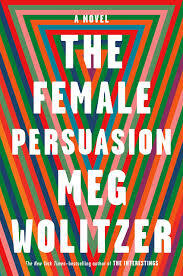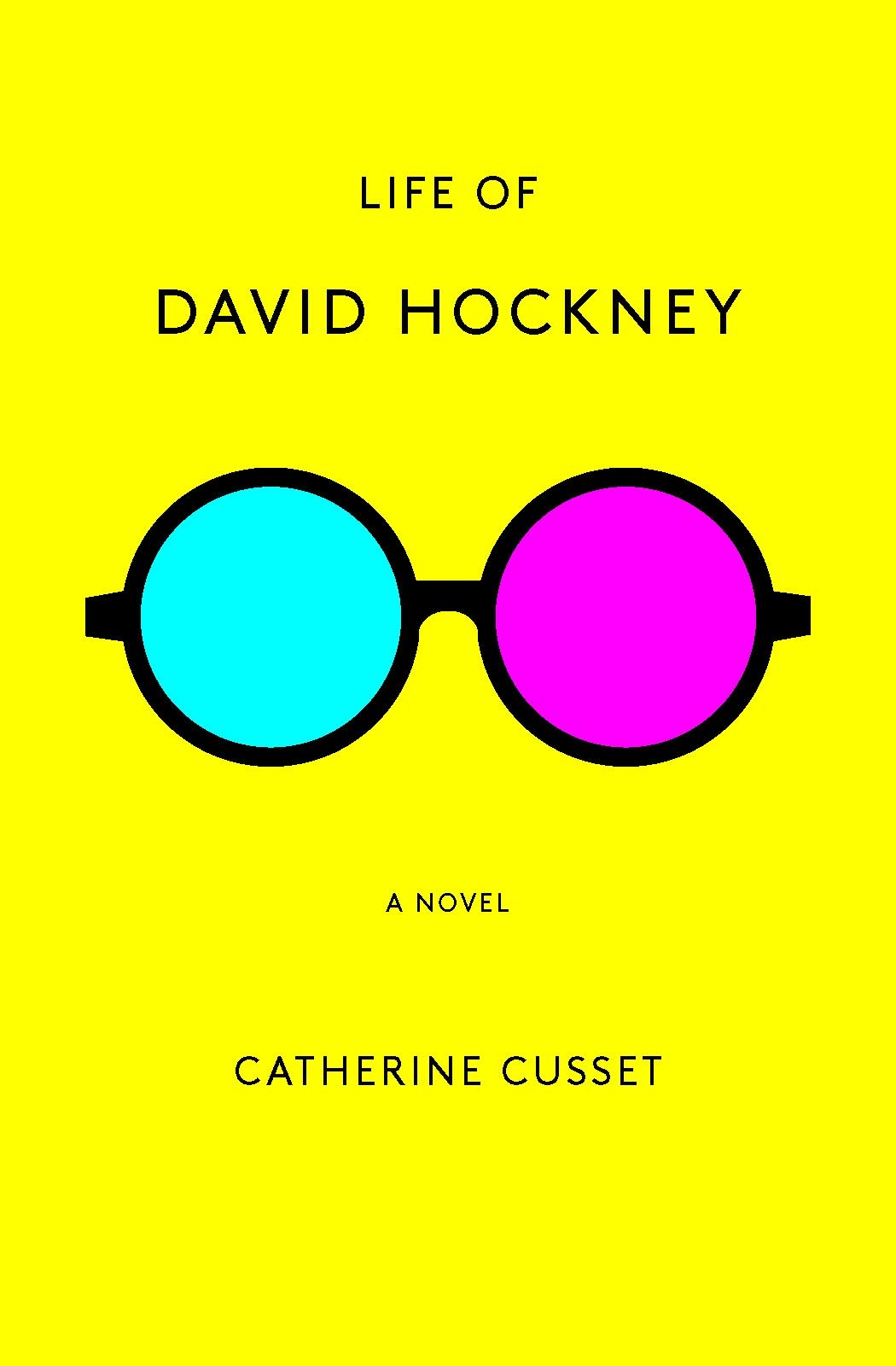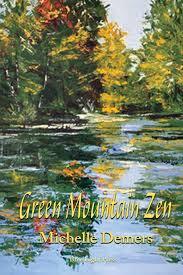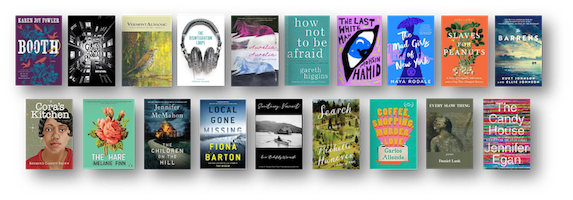Episodes

Sunday May 26, 2019
Meg Wolitzer - Interview #563 (5/20/19)
Sunday May 26, 2019
Sunday May 26, 2019

New York Times–bestselling author Meg Wolitzer, whose novel The Female Persuasion (Riverhead Books) is now in paperback.
For a new Write the Book Prompt, write a scene in which two characters meet for the first time. The main character has long idolized the other from a distance. In the scene, have that other person let down your main character in some way.
Good luck with your work in the coming week, and tune in next week for another prompt or suggestion.
Music Credit: Aaron Shapiro
* Audio excerpted courtesy Penguin Random House Audio from THE FEMALE PERSUASION by Meg Wolitzer, narrated by Rebecca Lowman.

Saturday May 25, 2019
Rachel Howard - Interview #562 (5/20/19)
Saturday May 25, 2019
Saturday May 25, 2019

Author Rachel Howard, whose debut novel is The Risk of Us (HMH).
This week’s Write the Book Prompt was generously offered by my guest Rachel Howard, and I can’t wait to try it. She says that it’s a somewhat arbitrary structure she came up with when she was teaching undergraduate creative writing at Warren Wilson College:
Write a lyric essay about one of the three great forces of life: sex, death, or love. The essay should never name whether it is about sex, death, or love, or use the word. The essay will consist of the following sections:
* A pure description of a significant place from your past. This could be a room, a street corner, the back of a car. Use as many concrete sensory details as possible. Ten sentences maximum.
* A character sketch of someone from your life. Six sentences max.
* One short description of a song. You may quote lyrics, but not use the words "sex," "death," or "love." Three sentences max.
* One scene with dialogue. Any length.
* One semi-obscure scientific fact that does not seem obviously connected to the rest of the essay (but which, metaphorically, is). Four sentences max.
Rachel concedes that it’s an unusual exercise, but give it a try, and you may well be surprised at the experience. And after the exercise generates the rough draft, you can move sections around, and start breaking the rules to fit the emerging organic form.
Good luck with your work in the coming week, and tune in next week for another prompt or suggestion.
Music Credit: Aaron Shapiro
N.B. A quote about trauma that I read during my interview with Rachel came from the book Beyond Consequences, Logic, and Control: A Love-Based Approach to Helping Attachment-Challenged Children With Severe Behaviors by Heather T. Forbes and B. Bryan Post.

Friday May 17, 2019
Catherine Cusset - Interview #561 (5/13/19)
Friday May 17, 2019
Friday May 17, 2019

Catherine Cusset, author of Life of David Hockney (Other Press).
This week’s Write the Book Prompt was generously suggested by my guest, Catherine Cusset. When we remember something that we've shared with another person - a story or incident - very often, two very different stories might emerge from the two perspectives. Memory is not reliable, and so different people will remember events differently. With this in mind, write the same event or story from the perspectives of two people who experience it. These can be two lovers, two siblings, a parent and child, two friends; whatever you choose. Consider how each experiences a moment in time - and the sensory details each notices (what they see, hear, smell, etc) - then write two versions of the same story.
Good luck with your work in the coming week, and tune in next week for another prompt or suggestion.

Wednesday May 08, 2019
Steven Wingate - Interview #560 (5/6/19)
Wednesday May 08, 2019
Wednesday May 08, 2019

Author Steven Wingate, whose new novel is Of Fathers and Fire (Univ. of Nebraska Press - Flyover Fiction).
This week’s Write the Book Prompt was generously suggested by my guest, Steven Wingate. He calls it “The Endless Sentence,” and it is designed as both a loosening up exercise and a means of exploration. It requires only a timer and your favorite writing implement (analog or digital). You simply set your timer for five minutes and start writing, and everything is allowed except one single punctuation mark: the period. Steven explains that writers rely on periods instinctively to separate thoughts from each other. If our thoughts feel like they’re getting too uncontrolled or scraggly, we end one sentence and start another. But if you take that tool away from yourself, you’re forced to keep flying through your thoughts with less control than you’re used to. Steven argues that this is a good thing because it means freedom—which is essential, especially early on in a project when you’re looking for a narrator’s (or character’s) voice. When you remove the period, you slip beneath your own radar and do things that surprise yourself. This can lead you to a new understanding of characters and settings, or maybe even to self-standing flash pieces with intriguing musical or formal features (e.g., lists or recurring verbal motifs). Try this especially when you’re feeling stuck or when a writing day hasn’t gone according to plan.
Good luck with your work in the coming week, and tune in next week for another prompt or suggestion.
Music: Aaron Shapiro

Wednesday May 01, 2019
Michelle Demers - Interview #559 (4/29/19)
Wednesday May 01, 2019
Wednesday May 01, 2019

Vermont Poet Michelle Demers, whose new collection is Green Mountain Zen (Blue Light Press).
This week's Write the Book Prompt was generously offered by my guest, Michelle Demers, who has a large staple of writing books from which she pulls exercises for herself and her classes. The exercise, titled "The Word Hoard," appears in The Cambridge Introduction to Creative Writing, by David Morley. Morley writes, “You should try to do this exercise every day, not only to keep your writing mind limber, but also to create a hoard of original and unusual phrases from which you can draw when you are writing. ‘Word hoard’ is a ‘kenning’ (a Norse poetic device ...), meaning ‘a supply of words’, such as a book, or vocabulary itself.”
Go to a shelf of books of fiction or poetry. Take one book at random. Close your eyes while opening that book and place your finger somewhere in it. Your finger will have landed on a word or words. Write the word down, as well as the three words preceding it and the three words following it in the text. You now have a seven-word phrase. Write this phrase in your notebook and, once you have written it, keep writing for five minutes. There are only two rules to this game: you must not stop writing; and you must not think. Try to write as fast as you can. You are not producing a work of art. After five minutes, you should have covered quite a lot of pages. Now read what you have written. Read it forwards, then read through it, word for word, backwards. Underline one phrase that strikes you as possessing any one of the following qualities: it has energy; it surprises you; it has never been written before in your language. The phrase must make a kind of sense; it must possess its own inner sense at the very least. That is, it must not be completely opaque in meaning. It might be a whole sentence, or it might be the end of one sentence and the beginning of the next. Now, write a short story or poem in which this phrase occurs without it seeming in any way out of place. You might wish to place the phrase into the mouth of a speaker in the poem or story, for example.
A I M : When we strive to be original, we tend to get tongue-tied, for we have been long taught that originality is no longer possible. ... this ‘free-writing’ exercise is effective for warming up for writing, but it is also effective at creating unusual phrases, ones that possess a surprising amount of personal linguistic energy. You are trying to capture ideas and sentences that you would not ordinarily come up with consciously.
Good luck with your work in the coming week, and tune in next week for another prompt or suggestion.
Music: Aaron Shapiro

